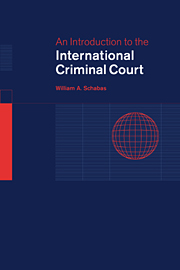Book contents
- Frontmatter
- Contents
- Preface
- List of abbreviations
- 1 Creation of the Court
- 2 Crimes prosecuted by the Court
- 3 Jurisdiction and admissibility
- 4 General principles of criminal law
- 5 Investigation and pre-trial procedure
- 6 Trial and appeal
- 7 Punishment and the rights of victims
- 8 Structure and administration of the Court
- Appendices
- Bibliography
- Index
5 - Investigation and pre-trial procedure
Published online by Cambridge University Press: 05 June 2012
- Frontmatter
- Contents
- Preface
- List of abbreviations
- 1 Creation of the Court
- 2 Crimes prosecuted by the Court
- 3 Jurisdiction and admissibility
- 4 General principles of criminal law
- 5 Investigation and pre-trial procedure
- 6 Trial and appeal
- 7 Punishment and the rights of victims
- 8 Structure and administration of the Court
- Appendices
- Bibliography
- Index
Summary
Many of the States involved in drafting the Rome Statute initially treated debates about the procedural regime to be followed by the Court as an opportunity to affirm the merits of their own justice systems within an international forum. Often, they were simply unable, because of training or prejudice, to conceive of the possibility that other judicial models from different cultures could offer alternative and perhaps better solutions to procedural issues. Describing debates in the International Law Commission, James Crawford noted ‘the tendency of each duly socialized lawyer to prefer his own criminal justice system's values and institutions’. But, over time, the drafters came to appreciate that there was much to be learned from different legal systems. Of course, they also recognized that compromise was essential if agreement was to be reached. As one observer of the Rome Conference said so eloquently: ‘the fight between common law and civil law has been replaced by an agreement on common principles and civil behaviour’. In this regard, the ongoing work of the ad hoc international criminal tribunals was of great value. Since their establishment in 1993 and 1994, the courts in The Hague and Arusha have been engaged in a fascinating exercise in comparative criminal procedure, borrowing the best from different national legal systems and in some cases simply devising innovative and original rules.
The procedural regime of the International Criminal Court is largely a hybrid of two different systems: the adversarial approach of the English common law and the inquisitorial approach of the Napoleonic code and other European legislations of the Romano-Germanic tradition (often described as the ‘civil law’ system).
- Type
- Chapter
- Information
- An Introduction to the International Criminal Court , pp. 94 - 117Publisher: Cambridge University PressPrint publication year: 2001



